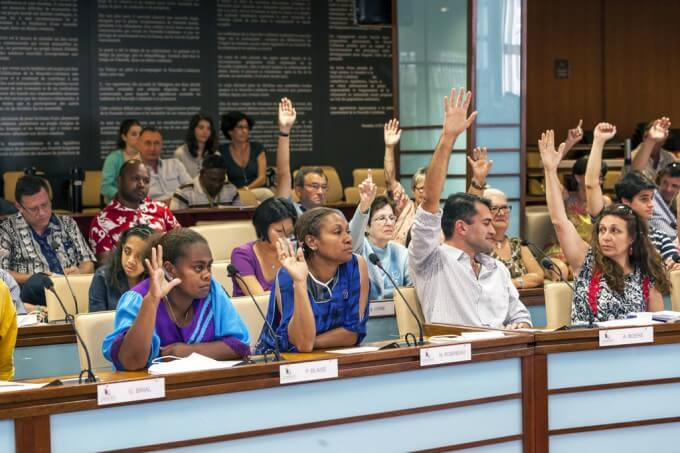 chargement
chargement
 chargement
chargement

When discussing certain specific issues, Congress may set up temporary special internal committees. At the behest of the executive committee or at least 20 % of members (ie 11) Congress may set up temporary commissions of inquiry that ar dissolved once their report has been tabled.
Apart from standard internal committees, Congress may set up special internal
committees to discuss special issues. These committees are temporary.
Congress dissolves special committee once they have fulfilled their brief. Congress
may also set the term of any further special committee in the instrument that sets it up.
– special committee to discuss the country bill on three official symbols for New
Caledonia set up by decision no 5 of 8 June 2009 that was dissolved when Country Act no
2010-11 of 9 September 2010 on three official symbols for New Caledonia was adopted;
– special committee to discuss projects and bills on New Caledonian overall tax reform
set up by decision no 154 if 30 November 2011. It was dissolved on 30 April 2014 following a
decision of Congress;
– special committee to jointly determine the country’s flag set up by decision no 241 of
27 December 2012. It was set up to exist for the duration of the third congressional term;
– special committee tasked with reforming the standing orders of the Congress of New
Caledonia. This committee is still current.
Special committees set up to counter the “rising cost of living” are committees “attached” to Congress rather than special internal congressional committees, as their membership includes representatives of employer bodies and trade unions who are not congresspersons.
At the behest of the executive committee or at least 20 % of members (ie 11), Congress may set up commissions of inquiry, the membership of which must be proportional to member groupings.
Commissions of inquiry are set up based on a written motion tabled in Congress. The motion must specify the events giving rise to the inquiry or the departments or companies whose management a commission is to examine.
Commissions of inquiry are set up to gather information on specific events or the management of New Caledonia’s public bodies with a view to tabling their findings in Congress. A commission cannot be set up while a matter is before the courts. If one has already been set up, its brief lapses as soon as legal proceedings are brought in the matter it has been tasked to investigate.
Commissions of inquiry are temporary.
Their brief expires once they have tabled a report or, at the latest, three months after the resolutions that set them up were adopted. They cannot be set up for the same purposes within the same year.
Persons appearing before a commission of inquiry may read the summary of proceedings for their hearing. If the hearing is confidential, they may only do so on location. No corrections may be made to the summary, but the person may comment in writing and the Commission may mention such comments in its report.
An inquiry report must be made within three months.
It is tabled in Congress at the sitting immediately after it was approved by the commission of inquiry. Members of Congress then vote on it, but may not amend it. If the members of Congress approve the findings of the commission of inquiry’s report, it is published in the Official Gazette of New Caledonia.
Only one commission of inquiry has been set up to date, namely by Resolution no 275 of 13 June on the suspension of the director of the tax department by the President of the Government. It tabled its report on 13 September 2013 and Congress approved it at a public sitting on 1 October 2013.
Congress elects an ad hoc committee made up of eleven congresspersons by largest-remainder proportional representation to delegate public service provision.
New Caledonia and its provincial governments can delegate the management of public services, ie task an organisation, including a private company, with managing public service provision. Delegating public services is a complex procedure that involves Congress at various intervals.
First of all, Congress must approve in principle whenever delegating country-level public service provision is proposed. It issues a decision based on a report to which a description of the services to be delegated to a corporation is appended. Congress must also elect some members by proportional representation to a committee tasked with examining the submissions made by the various corporations.
Once the tendering process has been completed in accordance with the requirements of the general territorial government body code and the committee has announced its findings, Congress discusses the company selected by the Government from among the submissions. Congress must respond within two months after the committee has been consulted. The documents required for a selection to be made must be tabled at least a fortnight prior to its decision.